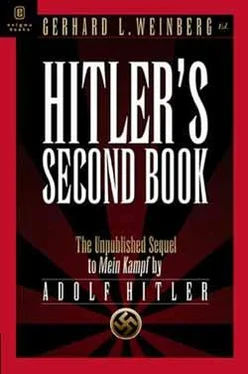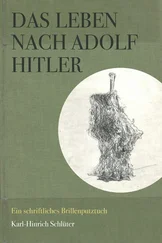It is also correct that no understanding at all over the Southern Tyrol can exist with the real wire pullers of this agitation against Italy, since to these elements the Southern Tyrol as such is a matter of indifference as much as is the German Nation in general. Indeed it is only a question of a suitable means for sowing confusion and stirring up public opinion, especially in Germany, against Italy. For this is what concerns these gentlemen.
Hence there is a certain ground for justification in the Italian objection that, regardless of what the treatment of Germans in the Southern Tyrol may be, these people will always find something suitable for their agitation, because they want precisely this. But for the very reason that in Germany today, exactly as in Italy, certain elements have an interest in thwarting an understanding between both Nations with all means, it would be the duty of wisdom to remove these means from them as far as possible, even despite the danger that they will try further. The opposite would make sense only if there were altogether nobody in Germany who had the courage to speak for an understanding in opposition to this agitation. This, however, is not the case. On the contrary, the more presentday Italy by itself seeks to avoid impolitic incidents, the easier will it become for Italy’s friends in Germany to expose the hate inciters, to unmask the sanctimoniousness of their reasons, and to put a stop to their Folk poisoning activity. But if in Italy they really believe that they cannot compromise in some way, in view of all the clamour and the demands of foreign organisations, without this looking like a capitulation rather, and possibly further increasing the arrogance of these elements, then ways could be found. Indeed such an obligingness could be fundamentally ascribed to those who not only are not involved in this agitation but, on the contrary, are the friends of an understanding with Italy and Germany, and themselves lead the sharpest struggle against the poisoners of public opinion in Germany.
The foreign policy aim of the National Socialist Movement has nothing to do either with an economic or bourgeois border policy. Our Folkish territorial aim, in the future as well, will assign the German Folk a development which need never bring it into conflict with Italy. We will also never sacrifice the blood of our Folk in order to bring about small border rectifications, but only for territory in order to win a further expansion and sustenance for our Folk. This aim drives us eastward. The east coasts of the Baltic Sea are for Germany what the Mediterranean Sea is to Italy. Germany’s mortal enemy for any further development, indeed even for the mere maintenance of the unity of our Reich, is France, exactly as she is for Italy. The National Socialist Movement will never fall into a superficial insipid hurrah! cry. It will not rattle the sword. Its leaders, almost without exception, have learned about war as it is in reality and truth. Therefore, it will never shed blood for any other aims save those which are serviceable to the whole future development of our Folk. Hence it also refuses to provoke a war with Italy for the sake of a border rectification, which is laughable in view of the German fragmentation in Europe. On the contrary, it wants to put an end for all the future to these unfortunate Teutonic marches to the south, and wants the advocacy of our interests to take place in a direction which makes the elimination of its need for territory appear possible to our Folk. By thus delivering Germany from the period of her present enslavement and servitude, we also fight above all for her restoration and thus in the interest of German honour.
If presentday Italy believes that a change in various measures in the Southern Tyrol would be viewed as a capitulation before foreign interference, without in the end leading to the desired understanding, then let her undertake this shift exclusively for the sake of those in Germany who themselves are for an understanding with Italians — thereby openly justifying them — and who not only reject being identified with the agitators against it, but who, indeed, have fought the sharpest struggle against these elements for years and who recognise the sovereign rights of the Italian State as existing, as a matter of course.
It is just as little a matter of indifference to Germany whether she keeps Italy as a friend, as it also is to Italy. Just as Fascism has given the Italian Folk a new value, likewise the value of the German Folk must not be estimated for the future on the basis of its momentary life expression, but according to the forces which it has so often shown in its former history and which, perhaps, it can again show tomorrow.
Thus, just as Italy’s friendship is worth a sacrifice on Germany’s part, German friendship is worth just as much to Italy. It would be a good fortune for both Folks if those forces in both countries who are the bearers of this knowledge could come to an understanding.
Thus, as much as the agitation against Italy in Germany is responsible for the unfortunate enmity, just as much guilt lies on Italy’s side if, in view of the fact that there is a struggle in Germany itself against this agitation, she herself as far as possible does not wrest the means from their hands.
If the sagacity of the Fascist regime one day succeeds in making 65 million Germans into friends of Italy, this will be worth more than if it educates 200000 into becoming bad Italians.
Likewise unsound was the Italian stand prohibiting the union of Austria with Germany. The very fact that France primarily espoused this prohibition perforce should have led Rome to take an opposite position. For France itself did not take this step in order to benefit Italy, but much more rather in the hope of being able to inflict harm on her thereby. There are primarily two reasons which induced France to push through the prohibition of the union: first, because thereby she wanted to prevent a strengthening of Germany, and second, because she is convinced that some day she can, in the Austrian State, acquire a member for the French European alliance. So Rome should not deceive itself that French influence in Vienna is considerably more decisive even than the German, not to speak of the Italian. The French attempt to transfer the League Of Nations to Vienna, if possible, stems only from the intention to strengthen the cosmopolitan character of this city as such, and to bring it into contact with a country whose character and culture finds a stronger response in the presentday Viennese atmosphere than does that of the German Reich.
As seriously intended as are the tendencies toward a union in the Austrian provinces as such, just as little are they taken seriously in Vienna. On the contrary, if in Vienna they really operate with the idea of a union, it is always only in order to extricate themselves from some financial difficulty, since France then is always sooner ready to lend a hand to the creditor State. Gradually, however, this very idea of a union will dry up in proportion as an inner consolidation of the Austrian federation occurs and Vienna regains its full dominating position. On top of this, the political development in Vienna assumes an increasingly anti Italian and especially anti Fascist character, whereas Austrian Marxism has at all times made no bones about its strong sympathy for France.
Thus the fact that at that time the union fortunately was prevented, and in part with Italian help, will some day lead to the insertion of the missing link between Prague and Yugoslavia into the French alliance system.
For Italy, however, the prevention of the Austrian union with Germany had been wrong even on psychological grounds. The smaller the fragmented Austrian State remained, the more limited naturally also were its foreign policy aims. A foreign policy goal, conceived on a grand scale, could not be expected from a State structure which has scarcely ………. square kilometres of territory, and hardly ………. million inhabitants. If German Austria had been annexed to Germany in the year 1919-1920, the tendency of her political thought would gradually have been determined by the great political aims of Germany, which were at least possible, that is, for a nation of almost 70000000. Preventing this at that time removed foreign policy thinking from greater aims, and limited it to small old Austrian reconstruction ideas. Only thus was it possible that the Southern Tyrol question could have at all grown to such an importance. For as small as the Austrian State was as such, it was at least large enough to be the bearer of a foreign policy idea which was in keeping with its smallness, just as, conversely, it could slowly poison the political thinking of all Germany. The more limited the political ideas of the Austrian State become in consequence of its territorial limitation, the more will they sprout into problems which can certainly have an importance for this State, but which cannot be viewed as decisive for the shaping of a German foreign policy for the German Nation.
Читать дальше












